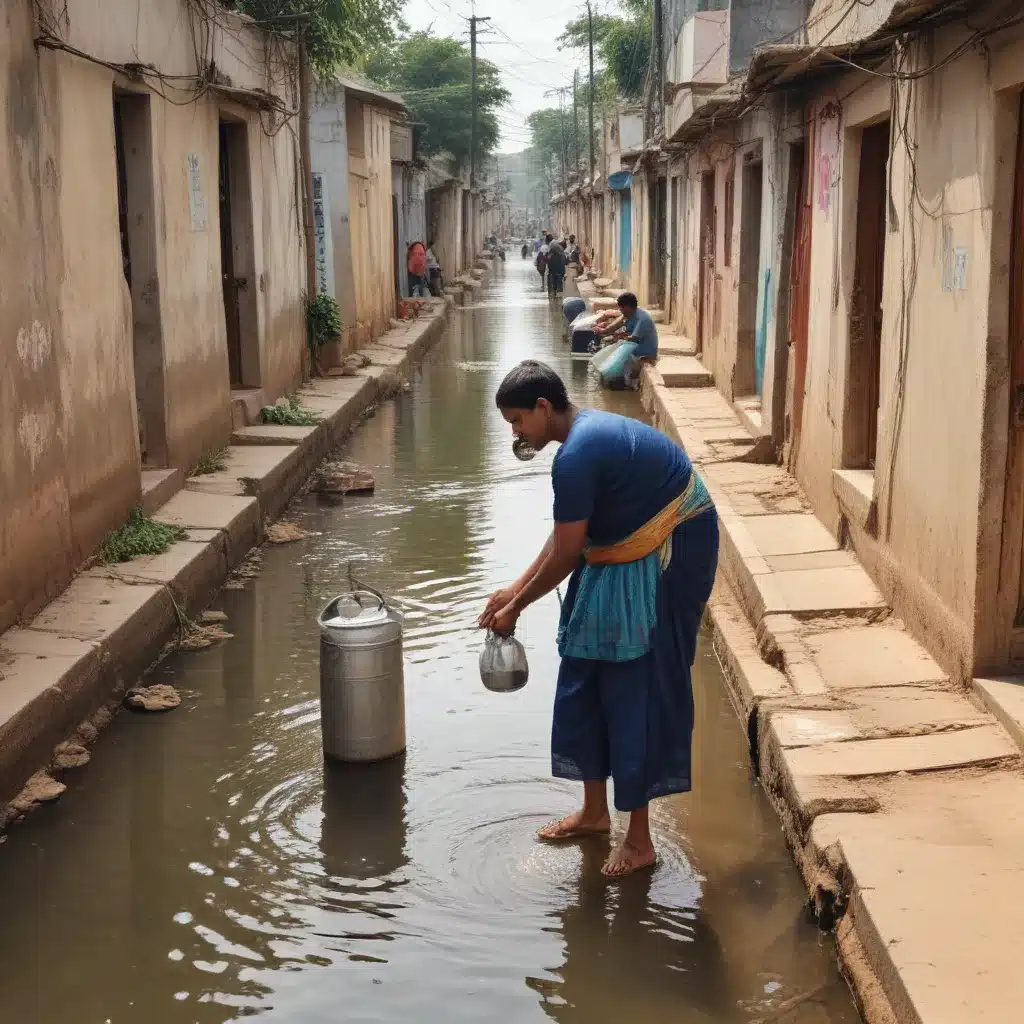
Addressing the Water Crisis through Community Engagement
In the bustling city of Hyderabad, India, access to clean and reliable water has long been a pressing challenge. With a rapidly growing population, the strain on the city’s centralized water infrastructure has become increasingly evident, leaving many neighborhoods without adequate water supply. However, a new wave of decentralized water solutions is empowering local communities to take control of their water resources, transforming the way Hyderabad approaches water management.
The Burden of Water Collection on Women
One of the most prominent issues facing Hyderabad’s water crisis is the disproportionate burden placed on women. According to studies, women in India are responsible for collecting 80% of the water in areas where access is limited, often walking long distances and waiting in queues to fetch water for their households. This not only places a significant physical and emotional toll on women, but it also limits their ability to pursue education, employment, and other opportunities that could improve their overall well-being.
The Rise of Small Water Enterprises (SWEs)
To address this issue, innovative decentralized water solutions, known as Small Water Enterprises (SWEs), have emerged as a promising approach. These community-based water treatment and distribution systems provide a sustainable and affordable alternative to the centralized water infrastructure, empowering local communities to take ownership of their water resources.
One such initiative is the iJal Women’s Empowerment Program, launched by Safe Water Network in the Medak district of Telangana. This program links self-help groups (SHGs) to new sources of income, offering over 170 women access to employment as water entrepreneurs. These women are trained to operate and maintain the iJal Stations, which deliver safe drinking water to more than 150,000 community members.
Empowering Women through SWEs
The iJal Women’s Empowerment Program is a transformative model that not only provides access to clean water but also fosters female entrepreneurship and economic empowerment. By training and employing women as water entrepreneurs, the program enables them to break free from the traditional burden of water collection and take on a more active role in their communities.
As Sita, a water entrepreneur in Medak, shares, “Before the iJal Station, I used to spend hours every day collecting water for my family. Now, I’m earning a steady income and have more time to focus on my family and my own personal growth.”
The program’s success has inspired Safe Water Network to expand the model to other regions, aiming to replicate the positive impact on women’s inclusion and empowerment across Hyderabad’s neighborhoods.
Decentralized Water Solutions: A Sustainable Approach
The benefits of SWEs go beyond empowering women; they also offer a sustainable and scalable solution to Hyderabad’s water crisis. Unlike the centralized water infrastructure, which relies on extensive distribution networks and energy-intensive treatment processes, SWEs are designed to be locally managed and operated, reducing the overall environmental impact and ensuring long-term reliability.
One such example is the Waterlife initiative, a social enterprise that has deployed more than 2,000 water purification plants across India, including in Hyderabad. These plants use reverse osmosis (RO) technology to treat contaminated groundwater, providing safe and affordable drinking water to communities that previously had limited access.
The Waterlife model emphasizes community engagement and ownership, with local residents trained to operate and maintain the plants. This approach not only ensures the sustainability of the water service but also fosters a sense of pride and responsibility within the community.
Harnessing Digital Tools for Improved Monitoring and Efficiency
To further enhance the effectiveness of decentralized water solutions, innovative digital tools have been integrated into many SWE initiatives. For instance, the iJal Stations operated by Safe Water Network are equipped with remote monitoring systems, allowing for real-time data collection and remote troubleshooting.
These digital solutions not only improve the operational efficiency of the water stations but also provide valuable insights into water usage patterns and water quality trends. By leveraging this data, SWE operators can make informed decisions, optimize service delivery, and adapt to the evolving needs of their communities.
Advocacy and Policy Support: Driving Systemic Change
While the success of SWEs in Hyderabad is undeniable, the long-term sustainability of these initiatives requires the support of policymakers and government agencies. Advocates and water sector experts are working to ensure that decentralized water solutions are integrated into the broader water management strategies for the city.
Organizations like Safe Water Network are actively engaging with local authorities, highlighting the benefits of SWEs and advocating for policies that create an enabling environment for community-driven water initiatives. By fostering collaboration between the public and private sectors, these advocates aim to ensure that the innovative models pioneered in Hyderabad can be replicated and scaled across the city, empowering more neighborhoods and communities.
Conclusion: A Future of Water Security and Empowerment
The decentralized water solutions emerging in Hyderabad’s neighborhoods are not only addressing the immediate water crisis but also transforming the lives of women and the broader community. By empowering local residents, especially women, to take ownership of their water resources, these initiatives are breaking down the traditional barriers and creating a more inclusive and sustainable water management system.
As Hyderabad continues to grapple with its water challenges, the success stories of SWEs and the iJal Women’s Empowerment Program serve as a beacon of hope, demonstrating the power of community-driven solutions to tackle complex water issues. By building on these innovative approaches and fostering continued collaboration and advocacy, Hyderabad can ensure a future of water security and empowerment for all its residents.
To learn more about the latest developments in decentralized water solutions and community engagement efforts in Hyderabad, visit https://jointactionforwater.org/.

